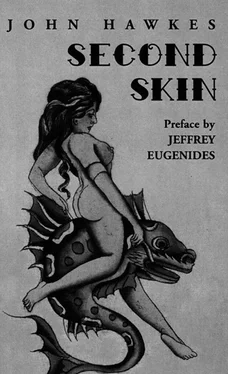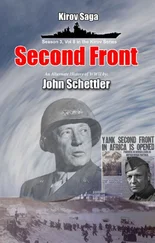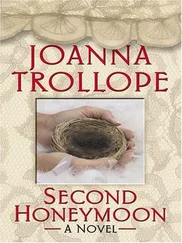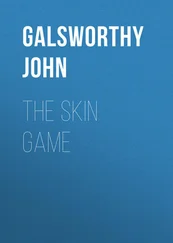“That’s all you are, Papa Cue Ball. The father of a woman who produces a premature child. The husband of a woman who kills herself. I renounce it, Papa Cue Ball. I renounce this family, I renounce this kind of a man. Can you explain? Can you defend? Can you speak to me with honor of your own Papa? No. So I renounce, Papa Cue Ball, I will escape one of these days. You may take my word. …
“If you don’t wish to come, Fernandez, then you may stay behind.”
“That’s what I wish. I do wish it, Papa Cue Ball, now that you put the words in my mouth! And believe me, I will follow my heart. …”
In front of the mirror in the little room stacked knee-high with the cardboard cartons which I had half-filled with poor Gertrude’s clothing, I was having trouble with the sword. Our limousine was waiting, scheduled to depart from the U-Drive-Inn, while the hearse was scheduled to depart, of course, from the mortuary. Or rather our limousine was scheduled to rendezvous with the hearse at the mortuary, the two black vehicles to proceed on from there together. And we were late and I was having trouble with my sword. Poor Gertrude. In the mirror I saw the smart dark blue uniform — it was Christmas, after all, the Christmas of ’44 and time for blues — saw the polished brass buttons, the white shirt still open at the neck since the baby was playing with my black tie, saw my bald head, freshly shaven cheeks, furrows over the bridge of my nose, and the unhooked and unwieldy sword. It was not my sword, it was the old man’s sword, and I had borrowed it late on that last night on the Starfish. I had thought a sword necessary for Gertrude’s funeral and now a couple of hooks were giving me trouble and the black scabbard was growing heavy in my hands.
“Cassandra,” I said into the mirror, “I wish you’d cry. And Sonny,” leaning forward, looking around for him in the mirror, “can’t you give me a little help with the captain’s sword?” Sonny was beginning to mourn, grief was beginning to overtake him in this ransacked room in the U-Drive-Inn, and he was scowling at Fernandez and holding Pixie on his lap. It was Sonny who had given the baby my black tie.
“All’s you got to do is speak up, Skipper. You knows that. I’ve helped the old man with his sword, and I can help you with it. You knows that.”
Sleeve of her camel’s-hair coat dangling from one of the boxes. Odor of gin. A scattering of small change, cuticle sticks, keys, all gleaming in the far corner of the room where I had been going over them, sorting things out. And on a fluffy beribboned hanger hooked to the top slat of the Venetian blinds her negligee, her pink negligee — I had rinsed it in the bathroom sink the night before, hung it to dry — now doing its long empty undulating dance in the cool currents of the air freshener that was humming low on the west wall. Poor Gertrude. I could never hold a grudge against Gertrude. No matter the motorcycle orgies with members of my own crew, half a season on a nearby burlesque stage, the strange disappearances, insinuating notes to Washington, and bills, bruises, infidelity here at the U-Drive-Inn, and even a play for faithful Sonny, no matter how she had tried to injure me or shame Cassandra, still I could never despise the early wrinkles, the lost look in the eyes, the terror I so often saw on the thin wide mouth, the drunken floundering. She was a helpless unpretty woman with dyed hair. She got a rash from eating sea food. She gave a terrible ammunition to those young members of my crew with whom she managed to have her little whirlwind affairs. And her early V-letters were always the same: “I hope they sink you, Edward. I really do.” She said she was going to drink up my insurance money when I was gone. Poor Gertrude. “You are going to hate me, Edward,” she wrote, “at least you won’t deny me hate, will you?” But she was wrong. Because the further she went downhill the more I cared. And Gertrude was no match for my increasing tolerance.
“Now give me my tie, Sonny,” I said, and there was the empty camel’s-hair sleeve, the sword at my side, my own uneasy look of consternation in the mirror. “The baby will have to play with something else. On the double, Sonny, we’re late already.”
“What about the child, Papa Cue Ball? You don’t intend to leave the child with me?”
“Yes, Fernandez. That’s the plan. Exactly.”
Then Sonny helped me with the knot and gave me his arm and Cassandra found my hat in the bathroom. Gertrude’s finger-prints were everywhere, her smell was everywhere — sweet lemon and a light haze of alcohol — and in the wastebasket a crumpled tissue still bore the lipstick impression of her poor thin lips stretched wide in the unhappiness of her last night alive.
And Sonny: “Look at that baby there, Skipper. She sure misses her Grandma!”
I nodded.
So I leaned on Sonny and Cassandra preceded us — bright sun, black limousine, bright shadows in the empty driveway — and so at last, and only twenty-five minutes late, we pulled away from the U-Drive-Inn and headed east in fairly heavy traffic to keep our rendezvous with Gertrude’s hearse. I could tell they had vacuum-cleaned the inside of our limousine. The upholstery was like gray skin and the sun was hard, brilliant, silent through the clear glass.
“Them swords are the devil to sit down with, Skipper. Ain’t they?”
I agreed with him. And then: “If we used the jump-up seats we could be carrying six instead of three. Did you notice that, Sonny? Wonderful room in these limousines. But I wonder why there aren’t any flowers?”
The traffic was heavy and all the other cars were filled with children. I could see them through the sealed glass, the smooth bright silence of our slow ride. Faint brand-new automobile smell, hard light, subtle sensation of new black tires humming gently through the perfect seat — gray skin, foam rubber, a bed of springs — and rising like a thin intimate voice into the receptive spine. And of course the driver. Something familiar about the driver — charcoal chauffeur’s jacket, white collar, charcoal chauffeur’s cap, dark glasses — a curiously muffled and familiar look about the driver. But I couldn’t place him and went back to stroking the warm handstrap and staring at the tints that were beginning to appear in the curves and along the edges of our shatterproof glass.
“Ask him if he has his lights on, Sonny. Funeral cars always have their lights on, don’t they, Sonny? We’d make better time with lights, I’m sure.”
We were only forty-eight minutes late, exactly, when we drifted to a marvelous stop beneath the bright green caterpillar awning and waited while the driver climbed the smooth white marble steps to report inside. The place looked empty. No sign of the hearse. No attendants in black swallowtails. Nothing. Then Sonny went in after the driver — grief riding his shoulders, dreading the interior of this establishment which was like home to me — and in close conversation, stooping, black shoes making startled noises on the marble, they returned together. Sonny opened the car door, stuck his head in, and Cassandra and I–Cassandra in her trim black dress, hair drawn tightly under the little hat — leaned forward as one. The black face was wet and the long black cheeks were more hollowed out than ever. His panther hand was trembling.
“Been some mistake, Skipper,” shaking his head, fanning himself with his black chief’s cap, “hearse gone on ahead without us. The man inside couldn’t tell us a thing. Anyways, we got to get a move on now.”
“Well, hop in, Sonny,” I said. “Let’s go.” Then leaning forward, touching the stiff driver’s charcoal arm and wishing I could see his face, “Listen,” I said, “it’s a matter of life and death. Do you understand?”
Читать дальше












